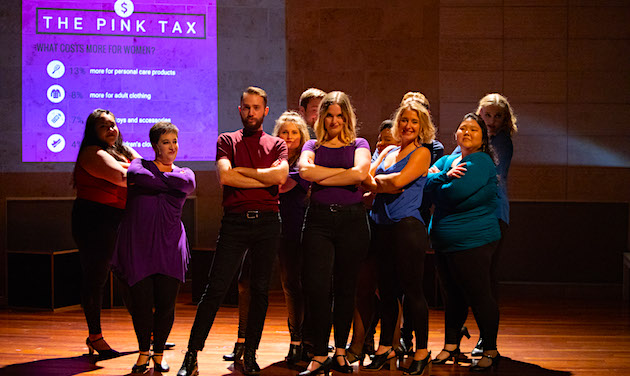
This weekend, the Opera and Musical Theatre Ensemble from the San Francisco Conservatory of Music gave a performance that initially appeared to check the box of inventive, relevant programming. “She Turns the Tide: Musical Theatre About Women by Women” sought to highlight the work of women in musical theatre, a realm dominated by names like Rodgers & Hammerstein, Stephen Sondheim, and Andrew Lloyd Webber.
As a prelude to the performance, videos were shown in which the evening’s actors spoke about women who inspired them. These were accompanied by a slideshow of brilliant, modern women such as Ruth Bader Ginsburg, Alexandria Ocasio-Cortez, and Greta Thunberg. All signs pointed to an evening celebrating women and their contributions to musical theatre. However, this theme was simultaneously belabored and unfocused, and the performance seemed disjointed as a result.

The second and third songs were excerpts from Fine and Dandy, the first hit musical completely scored by a woman — Kay Swift. Yet for all Swift’s efforts, the actors’ introduction for her work was a joke implying she owed her success to having had an intimate relationship with George Gershwin. While one could imagine the gag ostensibly served to highlight how history tends to remember details irrelevant to a professional woman’s career, it actually reinforced the narrative by crediting a famous man for a woman’s achievements. Unfortunately, this would be the only information or historical background the audience would receive on the women composers supposedly being celebrated that night.
As interludes between several numbers, many of the actresses shared personal monologues. These included one woman’s distress at her boyfriend having dumped her for a man; another getting drunk and naked at a fraternity party after her boyfriend’s inattention; one realizing that she needed professional help for anxiety after hearing how quickly her little brother was growing up; and one who cut ties with her biological father.

It is unclear what the prompt or common thread for these monologues was intended to be. Regrettably, the content of their speeches left the impression that the requirement was to speak about a man in their life and how that relationship impacted them — an odd decision for an evening centered on women’s achievements. I am hopeful that this was not the directors’ intention.
Also, between numbers, a statistic or quote would appear in the background about the status of women in the world today—for example, that two-thirds of the world’s illiterate people are women, or that one in six women will be the victim of an attempted or completed rape. While these are certainly troubling issues that deserve to be addressed, they were disjointed with the program. What does a charming performance of “What Baking Can Do” from Sara Bareilles’s Waitress have to do with these depressing statistics?

I applaud the efforts of Lauren Mayer and Michael Mohammed in conceiving this program, as the inclusion and recognition of women in music is of vital importance. Unfortunately, their realization of this theme missed the mark. Why not use those monologues to discuss the composers’ careers and firsts in their field? Shed some light on how they overcame sexism or other obstacles to achieve their success? Or explain why their compositions deserve recognition and a place in history? Furthermore, the slideshow of statistics would have been more relevant had it considered the hiring inequality in female directors and conductors, or the sexual harassment that vulnerable young actresses endure in hopes of landing a starring role.
Despite its worthy intentions, the performance fell short—a shame as there is clearly an incredible amount of talent in the vocal department. Particular highlights included Kathryn Rupp, who wowed with a wonderful voice and hilariously convincing display during Cyndi Lauper’s “The History of Wrong Guys” from Kinky Boots. And one could believe that the role of Elle Woods had been written for Kaylee Miltersen after her performance of “So Much Better” from Legally Blonde. Melissa Dufort and Christopher Wall also gave very engaging and powerful performances. The same consideration for performance should be given to the programming’s context when there is such a clear social message.





